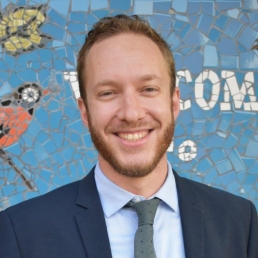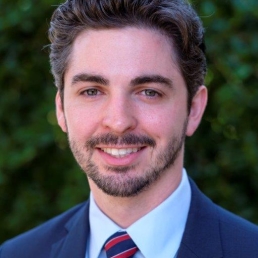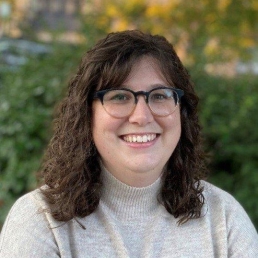BSPH Student and Trainee Policy Impact Award
The Institute for Health and Social Policy is pleased to announce a request for applications for our new Student and Trainee Policy Impact Awards. The awards provide up to $10,000 in support of innovative, timely and applied student-led public health policy projects. The awards are sponsored by the Institute for Health and Social Policy.
2024-2025 Cycle
Recipients from the July 30 Application Cycle

Kim DeFiori, PhD, Mental Health
Summary: There are an estimated one million lesbian, gay, bisexual, transgender, queer, and other gender and sexual minority (LGBTQ+) veterans in the United States, making the Veterans Health Administration (VHA) the largest healthcare provider of LGBTQ+ individuals in the United States.1 Compared to heterosexual veterans, sexual minority veterans are three times more likely to report a lifetime suicide attempt, twice as likely to have past-year suicidal ideations and four times as likely to report being likely to attempt suicide in the future.2 Compared to cisgender veterans, suicidality among veterans with a gender dysphoria diagnosis is twenty times higher.3 These findings highlight the urgent need to understand these inequities better and deploy interventions that reduce them. This dissertation will address this need through three distinct but complementary aims. Aim 1 will interview LGBTQ+ veterans and those who serve LGBTQ+ veterans to further understand the complexities of suicidal symptoms. Aim 2 will analyze a longitudinal survey of LGBTQ+ veterans using the results from Aim 1 to guide the analysis. Aim 3 will work with experts to understand how to best communicate the findings to a wide audience. These findings will help inform best practices in the VHA and possible interventions for LGBTQ+ veterans who are experiencing a mental health crisis. The VHA, being the largest provider of LGBTQ+ in the United States,1 can serve as a model for LGBTQ+ suicide prevention in healthcare.

Jeff Hom, DrPH, Health Policy Track
Summary: Despite the magnitude of the overdose epidemic in the US, fewer than 50% of retail pharmacies stock buprenorphine, one of the most effective treatments for opioid use disorder. On September 1, 2024, San Francisco will become the first jurisdiction to require retail pharmacies to stock this life-saving medication. We propose conducting approximately 10-15 qualitative interviews with retail pharmacists to understand 1) how they perceive this new law and 2) what resources they believe would be beneficial in helping them comply with the law. Findings from this study may have implications for how local governments can adopt policies to normalize medication availability.
Recipient from the March 30 Application Cycle

Victoria Green, PhD, Mental Health
Summary: Adults with serious mental illness (SMI) in the United States are at elevated risk for reduced access to and discontinuity in high-quality medical care for both physical and behavioral health conditions, leading to a high frequency of emergency department visits and inpatient hospitalizations. These disruptive, sporadic health care events can reduce community integration opportunities. Community integration—defined as how individuals with and without SMI live, socialize, and participate equitably in their communities—is an important facilitator and outcome of recovery from SMI. In Maryland, psychiatric rehabilitation programs (PRPs) are community-based programs that may address barriers to community integration among a high-needs subpopulation of adults with SMI. However, there have been policy challenges in Maryland regarding proliferation of lower quality PRPs and associated administrative costs. Maryland Department of Health’s Behavioral Health Administration is actively addressing this policy issue—that is, ensuring that higher quality PRPs that potentially improve community integration through reduced hospital admissions are adequately funded. The proposed research will evaluate the impact of Maryland PRPs on community integration among adults with SMI using a convergent parallel mixed methods design that will leverage ten years of Maryland Medicaid administrative claims data and in-depth semi-structured interviews with clients and staff of several PRPs in Maryland. Findings from this project are essential for 1) understanding if certain PRP characteristics reduce hospitalizations and 2) investing in PRPs that support community integration
among adults with SMI in Maryland.
2023-2024 Cycle
RECIPIENTS FROM THE November 30 APPLICATION CYCLE

Nan Dou, PhD Canidate, Pop Family Reproductive Health
Proposal summary: The Afterschool Supper Program provides nutritious meals to children, especially those from low-income households, during afterschool hours, to improve their nutrition and well-being status. While program participation steadily increased after its initiation in 2009, it fluctuated during COVID-19 pandemic, with an observation of a significant decline in 2022.
This proposed study will use multiple methods, involving state and district level quantitative data and the in-depth interview, to evaluate the implementation of the Afterschool Supper Program in Maryland for school years 2018-2023, covering pre-pandemic, COVID-19, and recovery periods. Specifically, the longitudinal state level data will be used to describe the program reach, including the participation rates and the types of supper program sites. The geospatial district level analysis, mapping supper program sites and their related sociodemographic factors, as well as the food desert status, will identify the at-risk communities. Additionally, this study will employ qualitative in-depth interviews with local organizations/agencies, state government, and food sponsors/providers to understand the operations of the program and identify the barriers and improvement strategies for program implementation. Overall, the goal of this proposed study is to enhance the implementation of the Afterschool Supper Program through identifying effective strategies to remove common barriers and improve program reach. This study will offer insights into future policies and strategies to promote the supper program in Maryland, as well as guide other states with low participation rates across the U.S.

Annie Sundelson, PhD Candidate, Department of Environmental Health and Engineering
Proposal Summary: The Russian Federation has a long history of spreading deliberatively false information (i.e., disinformation) about scientific research and public health. Since the invasion of Ukraine, however, Russian disinformation campaigns—particularly those containing false allegations of biological weapons research or development—have escalated. Such allegations could erode trust in life science and public health institutions, undermine support for cooperative biological research activities that are critical for achieving global health security, and weaken biological nonproliferation regimes and norms, increasing the likelihood of an engineered public health emergency. However, there is a lack of empirical evidence regarding the exact nature and consequences of Russian biological weapons disinformation, leaving policy makers unable to respond effectively to this threat. The proposed project seeks to fill this gap in knowledge by providing a comprehensive taxonomy of Russian biological weapons disinformation, an in-depth analysis of the volume, content, and framing of such disinformation in the context of the Biological Weapons Convention, and an empirical assessment of the extent to which Russian disinformation may alter state actors’ decision making regarding biological weapons. Findings from this project will inform the development of evidence-based policies to counter Russian disinformation, safeguard trust in public health and life science, and uphold the regimes and norms that prevent the proliferation of biological weapons.
2022– 2023 Cycle
RECIPIENTS FROM THE JULY 30 APPLICATION CYCLE

Odia Kane, MPH, BA, Department of Health Policy Management
Delivery
Summary: This project will examine provider and patient perspectives on digital therapeutics as viable interventions for chronic diabetes and depression with an eye toward developing policy recommendations for the implementation and review of digital therapeutics. Digital therapeutics (DTx) are web-based applications that use artificial intelligence and machine learning (AI/ML) to virtually manage, treat, and prevent medical conditions (Hong, Wasden, & Han, 2021). Since the onset of the COVID-19 pandemic, the FDA has issued guidance and regulation that supported an uptick in digital health production and encouraged more utilization, but the widespread use of AI/ML tools by healthcare facilities has been slow (Miao et al., 2022; Goldfarb et al., 2020; Kadakia et al., 2020). Providers and patients recognize benefits like increase access to care and improved patient monitoring, but are concerned about issues regarding data privacy, security, algorithmic bias, and increasing health inequities that can accompany new digital health products (Nebeker et al., 2019; Tyson et al., 2023). Even with the promise of innovative and evidence-based solutions for chronic health issues, without the buy-in of patients and providers, digital therapeutics will continue to be underutilized. With the findings of this project, creators of DTxs and policymakers can use insights from end users (patients and providers) to disseminate digital health tools that can be effective and embraced
Recipients from the March 30 Application Cycle

Justin Rose, PhD, Department of Health Policy Management
Summary: The U.S. is facing a historically deadly overdose crisis that has highlighted the need for greater access to substance use disorder treatment (SUDT). While most SUDT facilities are located in urban areas, disparities in geographic access within cities persist. Moreover, whether urban access to SUDT facilities has improved over time, and for whom, remains poorly understood. The role of city planning policies in shaping SUDT providers’ siting decisions and geographic access to treatment has received very little attention in the literature. Yet local zoning ordinances and land use controls, as well as “Not-in-my-backyard” activism (NIMBYism), greatly influence where behavioral health services are situated and shape health disparities in many ways. Using national survey data of SUDT facilities and a combination of qualitative and spatial statistical methods, this proposal aims to 1) identify the factors that shape where SUDT facilities locate, with a focus on the role of local land use policies, and 2) measure changes in geographic access to SUDT facilities in major U.S. cities,including identifying the factors that explain their present-day distribution. The findings will support local and state governments to identify and respond to inequities in access to SUD treatment amid the mounting drug overdose crisis.

Christopher Ross Hatton, PhD, Department of Health Policy Management
Summary: The proposed study will leverage a longitudinal study of caregivers living in Maryland during the COVID-19 pandemic to build a better understanding of caregiver knowledge of the enhanced child tax credit (ECTC) and the strategies used by state, local, and non-profit organizations to improve uptake and understanding of the ECTC in Maryland. Specifically, this study will use in-depth interviews with caregivers and staff to answer three questions. First, what outreach did caregivers experience, and what did they know or misunderstand about the ECTC? Second, what strategies did organizations use, and which did they perceive to be the most effective in facilitating ECTC outreach? Third, what obstacles did organizations experience when conducting outreach, particularly for hard-to-reach households? By answering these questions, the proposed study will help inform the structure of future federal tax credits, outreach for other social safety net programs, and ongoing implementation of similar programs at the state and local levels across the U.S.
2021– 2022 Cycle
Recipients from the March 30 Application Cycle

Lois Dankwa, M.S, Department of Health Policy Management
Summary: This proposal describes a project that will explore historical, political, and financial barriers to providing tailored services to patients through collaboration across clinical and community services. Document review and an iterative interview process will be conducted over the award period to identify opportunities to enhance complex care management and reimbursement practices for and around federally qualified health centers. This study will develop actionable evidence by 1) examining jurisdiction-specific, historical, social and policy context that shapes collaborative relationships, 2) investigating drivers of success for collaborative relationships at all levels of policy, and 3) exploring opportunities to improve reimbursement for community-based programs and organizations. The student investigator will work with mentors and additional partners to identify opportunities to translate research results into policy that will begin to establish clinical-community service relationships as a standard of care for patients with complex care needs.

Elizabeth Stone, M.S, Department of Health Policy Management
Summary: Despite elevated prevalence of mental illness among people with intellectual or developmental disabilities (IDD) compared to the general population, those with both IDD and mental illness face significant barriers to the receipt of mental health care. This is due, in part, to fragmented mental health and IDD service delivery systems. In an attempt to address fragmentation, Texas restructured their Health and Humans Services (HHS) system in 2017, eliminating the state’s IDD agency and moving those programmatic and regulatory responsibilities to HHS, which also houses the mental health agency. The purpose of this integration was to improve access to and quality of services by decreasing administrative burden, better integrating similar services and programs, and clarifying lines of accountability and performance measures. The proposed research examines the role of state agencies and effects of this agency integration on mental health service utilization and quality indicators among individuals with co-occurring IDD and mental illness (IDD/MI) using a concurrent mixed methods design combining in-depth qualitative interviews with state agency staff and IDD and mental health advocates with augmented synthetic control analyses of national survey data.
